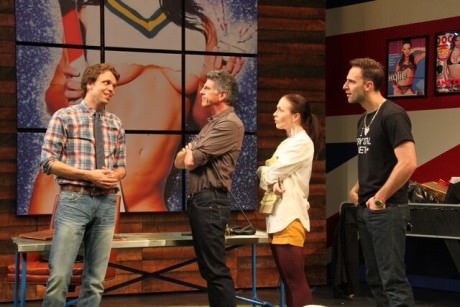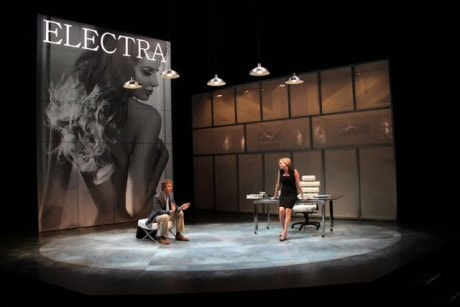Round House Theatre just opened a stunningly good production of NSFW directed by Meredith McDonough. The script by British playwright Lucy Kirkwood is a marvel in itself, because it is a scathingly hilarious comedy and much more.

The jokes, which erupt nonstop—like popcorn on a hot skillet, and just as scrumptious—have been spiked with something serious. They’re like barbed darts laced with truth serum. For in NSFW Kirkwood skewers the way men’s and women’s consumer lifestyle magazines aggravate and ameliorate their target audiences’ insecurities. And in so doing NSFW pokes a spot-on critique at the entire culture’s commodification of gender anxiety.
Myriad magazines pander to consumers’ self-doubt with goading promises:
Buy this product and you’ll be more of a man. Buy this product and you’ll be a more alluring woman. We can help you have more power, be more in control, get more girls. We can help you be sexier, please your man, find a man.
Kirkwood’s got those publications’ number. She reads the media’s message loud and clear.
The first part of NSFW is set in the office of a British lads magazine named Doghouse,and the colorfully graphic set design by Tony Cisek leaves little doubt as to the fixations of its demographic of gawkers: the walls, emblazoned with the Union Jack, are hung with blowups of magazine covers prominently featuring breasts.
Aiden, fortyish, is the canny, conniving editor, and James Whalen brings a dandy drive to the dude. He’s boss over three staffers whose quirks and qualms are a kick to watch: Rupert, a lanky trust-fund heir, is played with randy abandon by Danny Gavigan. Sam, a brain but a bit of a nebbish, is played with touching timidity by Brandon McCoy. Charlotte, the odd woman out, is played by Laura C. Harris with an agreeable affect of composure layered over a simmering inner anger that bubbles up but briefly. Charlotte belongs to a feminist group of women to whom she lies about what she does for a living. In the harsh economic climate that the script makes frequent reference to, both Charlotte and Sam desperately need their jobs and will do whatever it takes to keep them.
Except Sam does not want to accept an assignment from Aiden to go to the Arctic on a “man challenge” and write up the experience for Doghouse. Aiden pressures Sam but he resists, pleading that he has made elaborate plans to celebrate his girlfriend Rona’s birthday and surprise her with a marriage proposal. Though we don’t know it yet, Kirkwood has just slipped Rona into the play as a pivotal character.
The breast-obsessed plot combusts when Doghouse staffers learn that a cover model chosen by Sam is not 18 as he supposed but actually 14. This incriminating news comes from the girl’s father, Mr. Bradshaw, who shows up in a rage. He seems a bumbling country bumpkin but he’s no dummy. As he vents his indignation at the editor who pornographized his daughter, Todd Scofield brings to the role the emotional range of an impressive tragicomedian.
In a long scene between Aiden and Mr. Bradshaw, they face off to thrash out a payoff that could make the father’s lawsuit go away. Throughout it Charlotte remains standing, silent save for one word she speaks in answer to a question. Kirkwood’s choice to keep Charlotte on stage as an inscrutable witnessing presence (she could easily and plausibly be offstage) has a profound effect on how that scene plays. It is not just two adult men contesting the worth of a wronged girl’s life as measured by her looks. It is their dickheaded dispute seen through Charlotte’s eyes. And in Harris’s subtle performance, Charlotte’s unspoken reproach becomes eloquent.
Kirkwood knows exactly what she’s up to, which becomes breathtakingly apparent in the second part of the play. The scene has switched to the office of an upscale women’s magazine called Electra. Tony Cisek’s set is all sleek blacks, grays, and whites, and the magazine covers on the walls are high-fashion supermodel shots. Miranda, the beguiling, fiftyish top editor (emphasis on the guile), is played by Deborah Hazlett with fascinating flair.
As the scene begins, Miranda is interviewing Sam, who was fired from Doghouse after the underage-model debacle and is desperately seeking employment. The interplay between the two is extraordinary both as scripted and as played. It is as though theraison d’être for NSFW is to focus critically on two symbiotic cultural components—the men’s and then women’s—but only when we get deep into the women’s do the two parts cohere.
In a long passage Miranda, as an exercise, pressures Sam to identify the imperfections in photographs of models—and he can’t. But he must, she tells him. No woman is perfect; every woman is anxious about her imperfections; Electra exists to candidly expose those imperfections, help women not feel alone in them, and promise better beauty and a better body through products, treatments, regimens, diets.
This is the flip side of the puerile voyeurism celebrated at Doghouse: women of a certain age consumed with dread and self-loathing because they are losing their looks.

It turns out Rupert now works for Miranda. Aiden canned him then his father withdrew his trust fund and he needs the work. He enters with his face expressionless, having been Botoxed for a magazine feature in which a man experiences something a woman goes through. He cannot move his lips to speak because his face is numb so he simpers, and Gavigan’s comic turn is a gem.
Near the end Sam has a beautiful monolog in which he becomes in effect the conscience of the play. He tells a story about Rona, the woman he loved. They’ve broken up but he misses her terribly. And the way he describes their relationship could not be more opposite to the values espoused at either Doghouse or Electra. Rona was his soulmate, Sam says, and she became his hero. She was beautiful and she was brave. Once he and Rona were riding the Tube when a man exposed himself and tried to rub his genitals against her. Rona got all the other passengers shouting a shaming chant at the wanker and stopped him cold. The incident affected Sam deeply:
I just loved that, she’s just fearless…and I thought: I actually feel like part of something, you know? For the first time in my life I feel like I’m part of something, like we, people, together, can change things. People can stand up and stop shit things happening. Because that’s what it was like when I was with her, I felt…connected to the world, and all the things the world could be if we were just, better versions of ourselves, so it’s like that better world was sort of a shared space that existed in both our heads, so there was like a world, that we lived in together, that we’d helped to make and it was just for us, it was our secret…. I just really—love her.
Comedy often comes of anxiety. Many a guffaw masks nervous laughter. What is so wonderful about the Round House Theatre production of NSFW is that the heart of its humor comes of honesty. It lets us laugh even as we are looking at that which may not be a laughing matter—which makes for a powerfully on-point play.
Running Time: 95 minutes, with no intermission.
NSFW plays through June 21, 2015 at Round House Theatre – 4545 East-West Highway, in Bethesda, MD. For tickets, call the box office at (240) 644-1100, or purchase them online.




